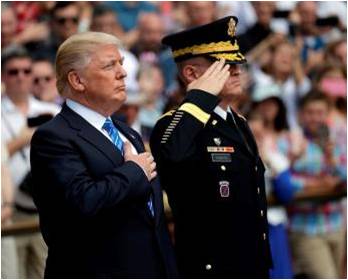Summary of the presentation to the NSF on….
Trump Administration’s National Security Strategy
Evaluating its Vision & Utility
With Keith Hansen
Keith Hansen took us on a very insightful and illuminating tour inside the first National Security Strategy (NSS) of the Trump Administration. Hansen discussed the key players and policies, national security challenges, strategic areas of focus, and threats from Russia, China, North Korea. Released in December 2017, the NSS codifies Trump’s “America First” philosophy through focused attention on revitalizing U.S. economic power, rebuilding the military, intelligence and diplomatic capabilities, defending our borders, protecting sovereignty, and advancing U.S. values.
Contrary to many expectations and predictions, the NSS does not portend an isolationist strategy for the United States under the new Administration. The international vision is robust and not dissimilar to that of prior Administrations, especially in its stated commitment to work with our Allies to counter rogue states (read North Korea and Iran), renew friendships in the Middle East (e.g., Saudi Arabia, Israel, Egypt), and crush radical Islamic terrorist organizations (like ISIS, al-Qaeda). Where this NSS differs from earlier doctrines is in its strong emphasis on fighting economic aggression and unfair trading practices, and its elimination of any mention of climate change as a national security threat.
Hansen adeptly led us through the key elements in the Five Pillars of the Security Strategy – protect the American People, promote American Prosperity, preserve peace through strength, advance American influence, and deal with regional threats and opportunities. He linked these elements to the national security threats presented by the Director of National Intelligence (DNI) in his Congressional testimony (May 2016).
So what does all this mean to you, me, and the federal agencies that need to put it into action? All Administrations are mandated by Congress to present their National Security Strategies to the U.S. citizenry, but these high-level documents do not become “real” until the national security departments and agencies “operationalize” them in planning documents and budget priorities, the National Security Council refines them into major U.S. policy initiatives, and the White House obtains support from Congress, the public, and our foreign allies. Yes, you do have a voice in what happens next!
Can we expect to see a shift in focus for the military and homeland security agencies as this new strategy moves from vision to policies to agency priorities to actions? Yes, most likely, especially in the renewed emphasis on countering new threats from traditional adversaries (Russia, North Korea, Iran) in cyberspace, the Middle East, Korean Peninsula, and the global economic network of trade, commerce and influence. Highlighting Russia’s indisputable attempt to influence our 2016 elections, Keith reminded us that even old adversaries can learn new tricks. He also reassured us that in the case of North Korea even new players seek traditional goals – that is, Pyongyang will strive to maintain control, deter a U.S. military strike, achieve international legitimacy, and unify the Korean Peninsula.
So, then, is a nuclear attack on the U.S. likely…in a word…no!
In addressing questions, Keith further elaborated that’s the new NSS clearly states the Trump Administration’s commitment to historical alliances, including NATO as long as the other partners are willing to share more of the financial burden. He addressed the growing complexity of the U.S.-China relationship, which needs to balance cooperation on issues such as North Korea and Syria, against the backdrop of China’s engagement in cyber hacking, unfair trading practices, and its evolving attempt to achieve hegemony in the South China Sea and more influence in Africa and Europe. He also reiterated the critical and expanding role that cyberattacks and cybersecurity, which China is increasingly employing, are playing in all aspects of Beijing’s attempts to diminish American influence and increase China’s role, particularly in the economic arena. In addition to China, the NSS also calls out Russia for being a mischief maker internationally.
Keith’s overview of the Trump Administration’s first National Security Strategy sets the stage for future National Security Forums presentations, including on the global economy, the national emergency alert system (witness what happened in Hawaii!), China, the subsequently released National Defense Strategy, and the upcoming Nuclear Posture Review. We are very fortunate to have Keith as an active member of the National Security Forum and look forward to hearing more updates from him in future presentations.
Keith Hansen has extensive experience in the defense and intelligence communities, having served as a US Navy officer for 30 years and as a National Intelligence Officer (NIO) for Strategic Programs and Nuclear Proliferation. He also supported and served on teams negotiating the SALT II, INF, START & CTBT accords.
Click the link below for Keith’s comprehensive PowerPoint
Trump Administration’s National Security Strategy Evaluating its Vision & Utility Jan 2018
Click the link below for the National Security Strategy Document


